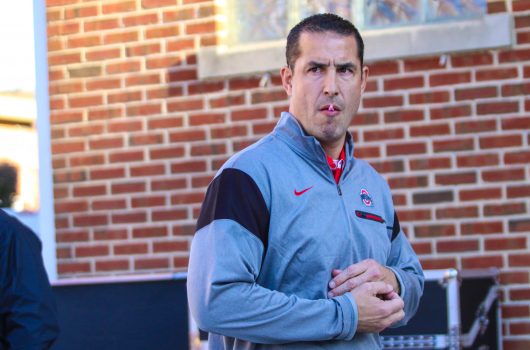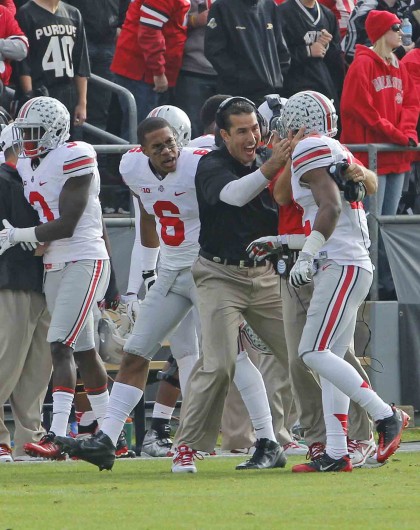
OSU co-defensive coordinator and linebackers coach Luke Fickell walks out of the Buckeyes’ locker room before a game against Maryland on Nov. 12. Credit: Alexa Mavrogianis | Photo Editor
When Urban Meyer was hired as Ohio State’s head coach at the end of the 2011 season, many saw the possibility for a dynasty.
Meyer’s MO had been his ability to implement a high-octane, prolific offense to whichever program he was coaching. He is one of a few coaches that reshaped the offensive landscape of college football, primarily switching to a spread from a pro-style offense.
Since the OSU football program’s earliest days, the Buckeyes have been viewed as a team that excels on the defensive end. Since 2002, when Luke Fickell joined the OSU staff, the characterization of a tough, blue-collar defense stood out in the program’s seven Big Ten championships, four national championship berths and two national titles.
The offensive firepower of an Urban Meyer offense combined with the traditionally stout Buckeyes’ defense was a formula many thought would put OSU in the running for a national championship every season. But Meyer came close to making his own recipe.
During Meyer’s first two years at the helm for OSU, the Buckeye defense wasn’t the same. After 24 consecutive victories, OSU dropped the Big Ten Championship game to Michigan State and the 2014 Discover Orange Bowl to Clemson. OSU allowed an average of 377 passing yards over the last three games. The Scarlet and Gray ranked 118th out of 125 teams in passing defense.
“I did not want to keep (Luke Fickell) when I got here,” Meyer said. “We weren’t very good on defense for a couple years and that stressed things out just a touch around here.”
Fickell served as interim head coach before Meyer arrived in Columbus in 2011, going 6-7. Fickell was retained by Meyer as co-defensive coordinator, sharing the duties with Everett Withers, who also coached safeties. After coming within earshot of playing for a national title in 2013, it was clear to Meyer that a change had to be made on defense.
In 2014, Fickell was the one who stayed and Withers took another job while current Rutgers head coach Chris Ash was hired by Meyer to replace Withers. The Buckeyes’ secondary underwent a complete overhaul, improving to 15th in passing defense and picking off 25 passes on its way to a national championship. Fickell, in charge of the linebackers, transformed Darron Lee into a freshman All-American after switching from safety.
Fickell has produced 12 NFL draft picks so far in his coaching career, as well as dominated the state of Ohio in recruiting — a couple reasons why the University of Cincinnati hired him as its next head coach.
“You do not have to be on the best terms at all times,” Fickell said. “Sometimes discomfort breeds growth. To push somebody deep down inside, you gotta know it’s for a reason. That’s the thing I can say, at times, we’ve had these discussions before we’ve had tough times. That’s a part of the game and what you really do is step back and able to realize how much you respect him because of it.”
In the midst of preparing for OSU’s national semifinal bout against Clemson on Dec. 31 in Glendale, Arizona, Fickell accepted an offer from Cincinnati to become the Bearcats next head football coach. The long-tenured Ohioan — the one who played for St. Francis DeSales High School in Columbus, played for John Cooper for four years and coached under Jim Tressel — now will attempt to create his own legacy in the same state that he has built his career.
A career that Fickell said wouldn’t be anything without his wife, Amy, and their six children.
“Sometimes you take advantage of the people you love the most,” he said. “My family understands that. My wife understands that, my kids understand that, I hope, to some extent. For right now, those are the things that suffer the most. I couldn’t do that without a great wife.”

Defensive coordinator and linebackers coach Luke Fickell celebrates with junior cornerback Doran Grant (12) following an interception during a game against Purdue Nov. 2, 2013 at Ross-Ade Stadium. OSU won, 56-0.
Credit: Lantern File Photo
If Fickell had left after 2013 for another job, he said that it wouldn’t have felt right not leaving on a high note. When former OSU offensive coordinator Tom Herman was hired at Houston during preparation for the College Football Playoff in 2014, he chose to coach throughout the playoff with the Buckeyes. Fickell will do the same this year, preparing for the CFP semifinal against the No. 2 Clemson Tigers (12-1), while trying to balance his position at Cincinnati.
“I told them even when I was introduced down at Cincinnati, I wanted to look at every kid and make them realize why I’m doing what I’m doing,” Fickell said. “I’m doing what I’m doing because we started something and I would never start something without finishing it.”
One of the players that Fickell has impacted the most is junior linebacker Raekwon McMillan. A five-star recruit from Hinesville, Georgia, that Fickell recruited, McMillan said the best quality about Fickell is his trust in his coaching, sticking with one defensive philosophy since McMillan’s freshman year in 2014.
McMillan was an impact player on the national championship team and soon will be another member of Fickell’s linebackers in the NFL. In his time at OSU, Fickell said he hasn’t seen a player that means more to a unit than McMillan.
“He’s been able to guide me through all my blessings I’ve been given here at Ohio State and put me in the position I’m in today,” McMillan said. “Through the ups and downs, he stayed on my side, and even the guys beside me, nurtured us and have us become men.”
In his last days as a an assistant coach at OSU, Fickell is facing one of his most difficult tasks yet as a defensive coach. Clemson averages 505.5 yards per game on offense, led by Heisman Trophy finalist Deshaun Watson.
In 2014, when Clemson put up 40 points and over 500 yards against the Buckeyes, some thought that result would spell the end for Fickell’s time in Columbus. Since then, Fickell has turned into one of Meyer’s most trusted colleagues the past three seasons.
“One of the greatest things I’ve ever done was keep Luke Fickell,” Meyer said. “He’s a loyal, good man and a very good friend of mine. We’ll be very close for a long time.”


